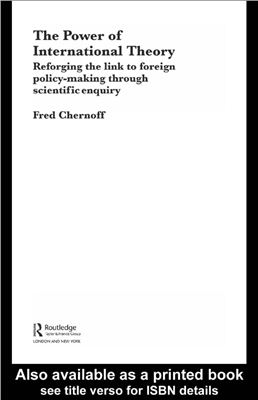Routledge, 2005. 253 p.
The field of inteational relations arose from the desire to assist and guide policy-makers to create a better and more peaceful world. However, many of the current trends, post-positivism, constructivism, reflectivism and postmodeism share a conception of inteational theory that undercuts the possibility of offering significant guidance to policy-makers.
The Power of Inteational Theory critically examines these approaches and offers a novel causal-conventional alteative that allows the reforging of a link between inteational relations theory and policy-making. While recognising the criticisms of earlier forms of positivism and behaviouralism, the book defends holistic testing of empirical principles, methodological pluralism, criteria for
choosing the best theory, a notion of ‘causality’ and a limited form of prediction, all of which are needed to guide policy-makers.
This book will be an invaluable text for advanced students and researchers in the fields of inteational relations theory and the philosophy of social science. Fred Cheoff is Professor of Political Science and Director of the Program in Inteational Relations at Colgate University, Hamilton, New York. He holds a PhD in Philosophy from The Johns Hopkins University and a PhD in Political Science from Yale University. He is also the author of After Bipolarity.
Policy-making, prediction and the theory of inteational behaviour
Social science, naturalism and scientific realism
Theory, observation and law
Natural causation, social action and inteational politics
Prediction, theory and policy-making
Explaining agreement and disagreement in the natural sciences and social sciences
The field of inteational relations arose from the desire to assist and guide policy-makers to create a better and more peaceful world. However, many of the current trends, post-positivism, constructivism, reflectivism and postmodeism share a conception of inteational theory that undercuts the possibility of offering significant guidance to policy-makers.
The Power of Inteational Theory critically examines these approaches and offers a novel causal-conventional alteative that allows the reforging of a link between inteational relations theory and policy-making. While recognising the criticisms of earlier forms of positivism and behaviouralism, the book defends holistic testing of empirical principles, methodological pluralism, criteria for
choosing the best theory, a notion of ‘causality’ and a limited form of prediction, all of which are needed to guide policy-makers.
This book will be an invaluable text for advanced students and researchers in the fields of inteational relations theory and the philosophy of social science. Fred Cheoff is Professor of Political Science and Director of the Program in Inteational Relations at Colgate University, Hamilton, New York. He holds a PhD in Philosophy from The Johns Hopkins University and a PhD in Political Science from Yale University. He is also the author of After Bipolarity.
Policy-making, prediction and the theory of inteational behaviour
Social science, naturalism and scientific realism
Theory, observation and law
Natural causation, social action and inteational politics
Prediction, theory and policy-making
Explaining agreement and disagreement in the natural sciences and social sciences

